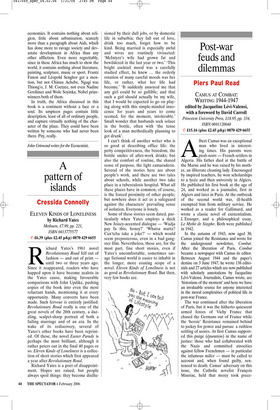A pattern of islands
Cressida Connolly
ELEVEN KINDS OF LONELINESS by Richard Yates Methuen, £7.99, pp. 221, ISBN 0413775577 ✆ £6.39 (plus £2.45 p&p) 0870 429 6655 Richard Yates’s 1961 novel Revolutionary Road fell out of fashion — and out of print until two or three years ago. Since it reappeared, readers who have happed upon it have become zealots in the Yates cause, making favourable comparisons with John Updike, pushing copies of the book into even the most reluctant hands, mentioning it at every opportunity. Many converts have been made. Such fervour is entirely justified: Revolutionary Road really is one of the great novels of the 20th century, a dazzling, scalpel-sharp portrait of both a failing marriage and of an era. In the wake of its rediscovery, several of Yates’s other books have been reprinted. Of these, the novel Easter Parade is perhaps the most brilliant, although it rather peters out in the final 40 pages or so. Eleven Kinds of Loneliness is a collection of short stories which first appeared a year after Revolutionary Road.
Richard Yates is a poet of disappointment. Hopes are raised, but people always spoil things: they become disillu sioned by their dull jobs, or by domestic life in suburbia; they fall out of love, drink too much, forget how to be kind. Being married is especially awful and wives are routinely vivisected: ‘McIntyre’s wife had grown fat and bewildered in the last year or two.’ ‘This bright cocktail mood was a carefully studied effect, he knew ... the orderly rotation of many careful moods was her life, or rather, what her life had become.’ ‘It suddenly annoyed me that any girl could be so gullible; and that such a girl should actually be my wife, that I would be expected to go on playing along with this simple-minded innocence for years and years to come seemed, for the moment, intolerable.’ Small wonder that husbands seek solace in the bottle, often with ‘the tense look of a man methodically planning to get drunk’.
I can’t think of another writer who is so good at describing office life: the petty competitiveness, the boredom, the brittle smiles of after-work drinks; but also the comfort of routine, the shared sense of purpose, the light camaraderie. Several of the stories here are about people’s work, and there are two tales about schools, while another two take place in a tuberculosis hospital. What all these places have in common, of course, is the forced proximity of other people; but nowhere does it act as a safeguard against the characters’ prevailing sense of isolation. Everyone is lonely.
Some of these stories seem dated, particularly when Yates employs a thick New Joisey-accented dialogue — ‘Wadja pay fa this, honey?’ ‘Whatsa matta? Can’tcha take a joke?’ — which would seem preposterous, even in a bad gangster film. Nevertheless, these are, for the most part, fine short stories, even if Yates’s uncomfortable, sometimes savage fictional world is easier to inhabit in the longer, more coaxing scope of a novel. Eleven Kinds of Loneliness is not as good as Revolutionary Road. But then, very few books are.





























































































































 Previous page
Previous page